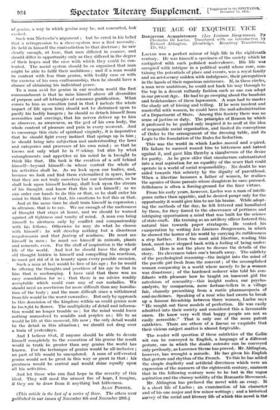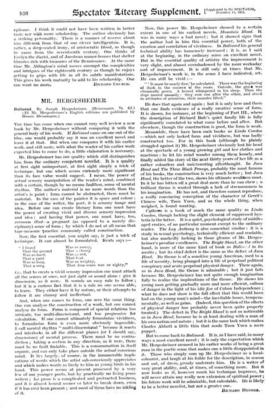TIRE AGE - OF EXQUISITE VICE
LACLOS was a perfect mirror of high life in the eighteenth century. He was himself a specimen of the society which he castigated with such polished -malevolence. His life was occupied' with intrigue in a political world whose core, con- taining the potentials of place and events, was a royal family and an-aristocracy sodden with indulgence, their prerogatives
in the hands of their rapacious mistresses. If, in these circles,. a man were ambitious, he could not hack his way through to
the top in a decent ruffianly fashion such as one can adopt in our present Age.. He had to go creeping about the boudoirs and bedchambers of _these lapwomen. A man- had- to- master the shady art of kissing and telling. If he were insolent and masterful with 'women, he could have the mal-administration of a Department of State. 'Among this Society there .was no sense of-justioa or duty. The principles Of Reason by which it professed to be guided only inspired it to scoff at the idea of responsible social organisation, and limited its conceptions or Order to the arrangement of the dressing table, and its Logic to the foundation of the Rules for Seduction.
This- was the world .which Lacks .moved and aspired. His failure to succeed roused him to bitterness and- hatred against it, and gave him thereby a simulacrum of the desire for purity. As he grew older that simulacrum substantiated into a real aspiration for an equality of the-sexes that could operate in a world of, social responsibility.. No doubt he was aided towards this. sobriety by the dignity of parenthood. When a libertine becomes a father of women, he realizes the agonies of those parents whose daughters he once pursued. Selfishness is often a forcing-ground for the finer virtues.
From his early years, however, Laclos was a man of intelli- gence rather than appetite, and he desired powtr only for the
opportunity it would give him to use his brains. While adopt- ing the methods of the day, he felt fettered and humiliated
by them, for they forced to the observance of pettiness and intriguing opportunism a mind that was built for the science of state-craft. His training as an artillery officer fostered this natural bias towards paper stratagem. He vented . his exasperation by writing Les. liaisons Dangereuses, in which he showed the horror of his world by carrying its ruthlessness a step further. Even the most arid libertine, reading _this book, must have stepped back with a feeling of being under- mined. Here is not the place to discuss the details of the story. Its cleverness takes one's breath away. The subtlety of the psychological reasoning—the insight into the mind of the puerile girl fresh from the convent ; of the accomplished woman conquering in a world where merely to .be a woman was disastrous ; of the hardened seducer who told his con- fidante with pleasure how he taught an innocent girl the catechism of sensuality—this insight makes our psycho- analysts, by comparisons mere - fortune-tellers in a village fair, clumsily prescribing from a rustic pharmacopoeia of soul-medicines. Speaking of a roué who had sworn to break up a famous friendship between -three women, Laclos says " He sought out these models of perfection. He was easily admitted-into their society and considered this a favourable omen. He knew very well that happy people are not so easily accessible." . That is only one of the more patent subtleties. There are others of , a finesse so exquisite that their vicious subject matter is almost forgivable.
The reader will question if these subtleties of the Gallic wit can be conveyed in English, a language of a different gesture, one in which the double entendre can be conveyed only perilously, as Laurence Sterne has proved.. Mr. Aldington, however, has wrought a miracle. He has given his English that gesture and rhythm of the French. To this he has added the simple duplicity and artificial directness which were an expression of the manners of the eighteenth century, manners that in the following century were to be lost in the vague aspiration and the clumsy nobility of the Romantic Movement: Mr. Aldington has prefaced the noirel with an essay. It is a short life of Laclos ; an examination of his character and of his one major and few minor writings ; and a historical survey of the social and literary life of which this novel is the
epitome. I think it could not have been written in better taste_ nor with more scholarship. The author obviously has a striking personality. There is a manner of reserve about hint different from that of our clever intelligentsia. It is, rather, a deep-seated ,irony, of aristocratic blood, as though he came from the seventeenth century. One thinks, of Evelyn the diarist, and of Jacobean manor-houses that shelter libraries rich with treasures of the Renaissance. At the same time Mr. Aldington's mind moves amongst the complexities and intrigues of the eighteenth century as though he enjoys getting to grips with life in all its subtle manifestations. This gives his work maturity to add to his scholarship. One



























































 Previous page
Previous page